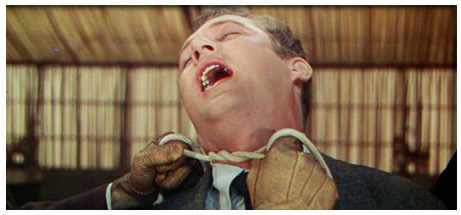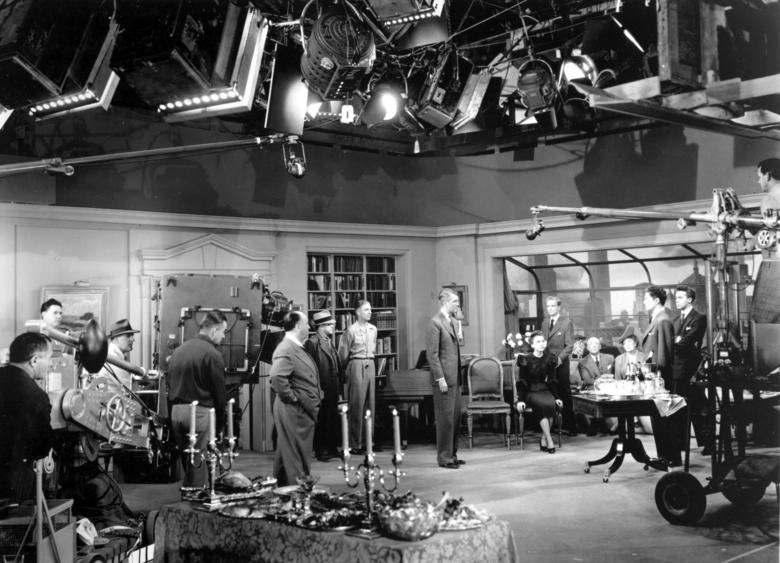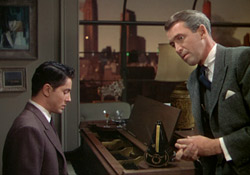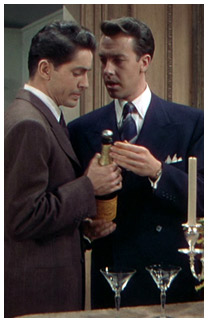Personal Canon #100: "ROPE"
 Wednesday, June 22, 2011 at 5:19PM
Wednesday, June 22, 2011 at 5:19PM 
Rope (1948) Directed by Alfred Hitchcock | Screenplay by Arthur Laurents, Hume Cronyn, and Ben Hecht based on the play "Rope's End" by Patrick Hamilton | Starring: James Stewart, John Dall, Farley Granger and Cedric Hardwicke | Production Company Transatlantic Pictures and Warner Bros | Released 08/28/48
Hitchcock and the Continuous Shot
Alfred Hitchcock served as auteur-theory training wheels for me. I doubt I'm alone in this. Perhaps it's the confines of his chosen genre that throw his presence as a director into such unmistakable relief. Or maybe it's his celebrity, cultivated through that famous profile, press-baiting soundbites, celebrated fetishes, and television fame. But what it comes down to is this: when watching a Hitchcock film, even uneducated moviegoers, even movie-loving children can suddenly wake up to the notion of the man behind the curtain. Movies do not merely exist. They are built. The realization can be thrilling: Someone is actually choreographing this whole spectacle for my amusement!
And on the subject of choreography I give you Alfred Hitchcock's Rope. I gave myself Rope, actually, it being the first Hitchcock I sought on my own as a budding film fanatic. 'Let's see what else this man behind the curtain, this wizard, can do.' In this case what he could do was quite a lot. Though Rope obviously represented a complex coordinated puzzle for the filmmaking team, the plot is unusually simple. Two former prep school mates kill a third for the thrill of it (this is no spoiler, just the opening scene). They chase their "perfect murder" with a cocktail party to which they've invited the victim's loved ones.
The film's claim to fame for whatever meager fame it has managed --and I'd argue that that's disproportionate to the elaborately perverse buffet it serves up as well as its pivotal place in the director's career (first color film, first post-fame failure, second attempt at a confined space thriller, a form which would reap perfection for the auteur on his third attempt: Rear Window, 1954) -- comes from Hitchcock's formal experimentation. For Rope he uses one camera, one set and only nine actors. And then, here's the famous part: Hitchcock films it all in one continuous shot. Or thereabouts --there are five or six noticeable edits (and a few more I'm told) but why quibble? Jimmy Stewart's reliably grounding charisma aside, Hitchcock is Rope's true movie star and Rope's continuous shot is the mythmaking close-up. It just happens to be stretched across the entire 80 minutes.
 the soundstage filming of Rope
the soundstage filming of Rope My point, though I meander is this: Hitchcock doesn't even need editing, one of the chief tools of movie making, to breathe life into his creation. Thrillers these days often use editing as a crutch, particularly sharp jagged cutting which serves as a shortcut to provoke fear in the audience. But it's really only disorientation and startled seat jumping that's achieved: this kind of fear almost never outlasts a movie. Once the lights have gone up, equilibrium is restored. Unless you carry a working strobe light around with you, your life has no jump cuts. Outside the theater the world is lived in one long continuous shot again. For my moviegoing dollar, there's nothing as enduringly disturbing as something you're allowed a good uninterrupted look at. Whether a film is traipsing in true horror territory: I think of "Bob" stepping over the couch --fully lit (!) --to strangle Maddy in Twin Peaks or Samara emerging fom the TV in Ring for one last murder, or working a psychological nightmare: I think of that hypnotic endless close-up of Nicole Kidman in Birth, a woman on the verge..., nothing beats a movie that refuses to let you look away. Rare are the directors with the balls to say: This, and this alone is what you'll stare at. Though it pains you to look, this is what you'll see.
My point, though I meander is this: Hitchcock doesn't even need editing, one of the chief tools of movie making, to breathe life into his creation. Thrillers these days often use editing as a crutch, particularly sharp jagged cutting which serves as a shortcut to provoke fear in the audience. But it's really only disorientation and startled seat jumping that's achieved: this kind of fear almost never outlasts a movie. Once the lights have gone up, equilibrium is restored. Unless you carry a working strobe light around with you, your life has no jump cuts. Outside the theater the world is lived in one long continuous shot again. For my moviegoing dollar, there's nothing as enduringly disturbing as something you're allowed a good uninterrupted look at. Whether a film is traipsing in true horror territory: I think of "Bob" stepping over the couch --fully lit (!) --to strangle Maddy in Twin Peaks or Samara emerging fom the TV in Ring for one last murder, or working a psychological nightmare: I think of that hypnotic endless close-up of Nicole Kidman in Birth, a woman on the verge..., nothing beats a movie that refuses to let you look away. Rare are the directors with the balls to say: This, and this alone is what you'll stare at. Though it pains you to look, this is what you'll see.I hadn't watched Rope in a very long time and returning to it I found it sicker, funnier, and a bit sloppier than I remembered. Today it plays a little like an indie black comedy with a nasty dollop of winking gay panic. The relationship between the murderers is of the Leopold & Loeb school of evil homosexuals. Though this thriller was made in 1948, it could only read gayer if the men where shirtless or wearing leather harnesses.
This, for instance, is how the post murder scene plays out...
 Two men, having just done the dirty deed, argue. The more aggressive man, Brandon, complains that they couldn't do it with the lights on, in the sunshine. His partner in crime, Phillip, has instant regrets. He could only do it in the dark. A cigarette is lit. More small talk and then they stand uncomfortably close together popping the cork (yes, really) on a bottle of champagne.
Two men, having just done the dirty deed, argue. The more aggressive man, Brandon, complains that they couldn't do it with the lights on, in the sunshine. His partner in crime, Phillip, has instant regrets. He could only do it in the dark. A cigarette is lit. More small talk and then they stand uncomfortably close together popping the cork (yes, really) on a bottle of champagne. Phillip: [guilt-ridden] Brandon, how did you feel?Brandon: When?Phillip: During it.Brandon: I don't know really... I don't remember feeling much of anything. [suddenly excited] Until his body went limp and I knew it was over!Phillip: [trembling] And then...Brandon: And then I felt...tremendously exhilarated. [Pause] H-h-how did you feel?
When I was younger, most of Rope's sexual content slipped by me, anyway. The contact high I got from it was unrelated to adult naughtiness. It provoked no juvenile tittering. No, the thrills came from Rope's easy to grasp experimentation. I simply loved the gimmick. I caught another glimpse of the man behind the curtain. I still feel the same way when I watch it: give me more of this. Provide me with an uninterrupted supply of auteurs who want to challenge themselves. Give me more Hitchcocks, Von Triers, Haynes, Soderberghs. Experiment with the form. And then I'll feel... tremendously exhilarated.



Reader Comments (3)
One of my favorite Hitchcocks. Once played a drinking game where we drank with every gay reference. It didn't take long before we were completely hammered.
I have always loved Rope, although it's not top-tier Hitchcock for me. What I love most about the "single take" is how inevitable it makes everything feel. That scene where the maid is taking everything off the chest where they stashed the body? It's horrifying because you just KNOW she's going to open it at some point - it's also a pretty nifty way of making us feel for these two (well, one-and-a-half) despicable characters. Have you read the play it's based on? Arthur Laurents (who was in a relationship with Farley Granger at the time) really punched up the gay subtext, which he got away with by keeping the Brit-speak "dear boy" to throw off the censors. Silly censors.
Oh, may I have a glass of Veuve too?